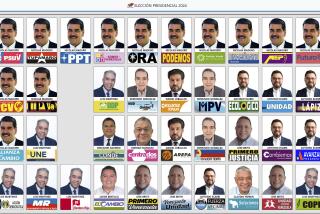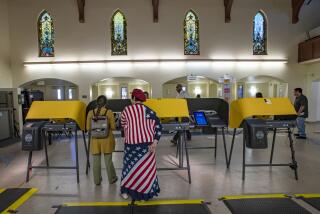No Baby-Kissing : Soviet Vote: Glasnost on the Hustings
- Share via
MOSCOW — The hall was in an uproar.
Voters were screaming at their district’s three candidates and each other. Volunteer militiamen wearing red armbands, who in earlier years would have simply thrown the “hooligans” out, stood by helplessly. Only the four-foot-high bust of V. I. Lenin looked calm.
“Who exactly nominated you?” one man called from the floor, addressing candidate and Communist Party member Leonid I. Kozlovsky. “You are trying to provoke me!” Kozlovsky bellowed in response, looking very much as if the questioner had succeeded.
“Comrade voters, please try to respect one another,” implored the moderator, clearly unnerved by his inability to restore order. “Is this what they call democracy?”
It is indeed. But do the Soviets want it, and can they make it work?
March 26 Elections
That is what this Communist country is struggling to find out amid campaigning for the March 26 elections to the newly created 2,250-member Congress of People’s Deputies--the first competitive national elections since the earliest days of the Soviet state.
It is campaigning of a different flavor than voters find in the West. Kissing babies and facing tough questions is not a whistle-stop tradition here, and those candidates trudging down the campaign trail are breaking new ground. Much of the effort to win votes occurs during meetings in neighborhood halls at night.
In the past, single-candidate balloting meant that Communist Party leaders never needed to attract voters, offer an election platform or face questioning from the public. Back-room politicking was the order of the day.
Confusing and Unruly
Not so this time around. And like many candidates, Kozlovsky, a party member for 27 years, has never seen the likes of this. As voters find their voices, election rallies are often confusing, unruly sessions.
“In the United States, the campaign process has been refined over 200 years and is well-oiled,” Soviet journalist Vladimir Pozner, who has covered many American elections, said in an interview. “In this country it is still chaotic, to say the least, with people hooting, whistling and stomping their feet to make their views known.”
One of the biggest complaints has been about the nominating procedure itself. Some potential candidates were rejected in meetings led by party bureaucrats given the job of interpreting vague and confusing election rules, and more than 80% of those who survived the nominating procedure are Communist Party members. In addition, a quarter of the seats are uncontested.
Nevertheless, Soviet citizens have had unprecedented opportunities to speak their minds during the campaign.
On this particular night, Kozlovsky and his two competitors from a central Moscow constituency had gathered for what was billed as a debate. But the candidates, all Communist Party members, did not argue with one another. (“It is not proper to point out bad traits in our competitors,” candidate Peter S. Surov said from the podium.) Instead, they answered pointed questions written, and sometimes yelled, from the audience of 500.
As a sign of the newness of such democracy here, it took 15 minutes even to decide how the meeting would be run.
Some suspicious voters, fearing that the candidates would not read the full questions out loud, wanted an impartial observer to read them. Three people from the audience volunteered for the job and walked up on stage. But others called out for them to leave, and with the new freedom to choose, it was unclear which choice would win out.
The moderator finally put a halt to that round of arguing, saying those who were worried could come read the questions themselves after the meeting was over.
On to the Debate
So, on to the debate. Kozlovsky, 51, director of a plant that makes farm machinery, was asked to explain why he had recently laid off workers over the age of 65. He blamed it on a decision by the plant’s workers’ committee.
Meanwhile, Surov, the 51-year-old chairman of the Moscow Building Commission, was asked to give his telephone number to the audience because some wanted to talk with him privately about poor building practices. He complied.
The third candidate, Yuri V. Skokov, 50, director of a battery-making factory, was asked: “Constantly we are told by our bureaucrats to fight, fight, fight and struggle, struggle, struggle. What are we fighting for, and how long must we struggle?”
Skokov’s brief answer in many ways went to the heart of what this new rough-and-tumble process is about. “We have lost the ability to think for ourselves,” he said. “We must fight until we have that again.”
Indeed, the struggle to regain that right is perhaps what has marked this first campaigning season the most. Voters have spent many hours watching candidates on television and gathering at meetings in their neighborhoods. And they are eager to express themselves.
“The campaigning has been a step forward for this society. The questions asked by the voters are often radical. They complain about their daily lives and raise ideas long repressed,” Marshall Shulman, a visiting Soviet specialist from Columbia University, said. “Some even call for a multi-party system and direct election of the head of state.”
But Shulman said he doubts whether this election alone will change the Soviet system. “The (election) law is complex, and the results can be manipulated, and I doubt we will end up with many radical thinkers and the same kind of debate in the Congress of People’s Deputies that we are seeing now,” he said.
SH Responses Sound Stale
While the voters have raised tough questions, some have complained that the responses from the candidates sound stale. Some candidates still seem to do little more than parrot the party line. They all support perestroika, President Mikhail S. Gorbachev’s policy of economic reform, and better living conditions for the people in their districts.
“Like the old calls of ‘Long live the revolution,’ perestroika is becoming simply another slogan,” one voter complained. But the platforms may seem old hat simply because under Soviet law, the candidates’ proposals cannot contradict the constitution, and each candidate must state how he has contributed to perestroika.
In addition, Communist Party ideology chief Vadim Medvedev has warned the Soviet media that if candidates make promises they obviously cannot meet, those promises should not be published.
“So naturally, differences between the candidates are usually not that great. They are all for Mother’s Day and against man-eating sharks,” said Steve Cohen, the head of Princeton University’s Russian studies department, who is currently spending four months in Moscow.
“We have that same situation with our candidates in the United States,” Cohen said. “In this way, the two systems are similar.”
But there are, without doubt, some sharp and striking differences between American and Soviet campaigning.
First, there is no need to audit campaign budgets--the state pays for everything, including transportation, leaflets printed up by candidates and television time to express their views.
Each candidate is legally permitted to have up to 10 aides, and the candidate and his aides are all given time off work, with pay, to handle the business of campaigning. The state has allocated more than 155 million rubles, or about $250 million, to cover these expenses.
Little Mud-Slinging
A second difference is that Soviet candidates, no matter how they may feel privately, publicly eschew the Western idea of political competition and almost never engage in the negative campaigning that has marked American politics all the way up to the race for the White House.
“Sportsmen compete,” Surov said in an interview when asked about this issue. “In this election, my goal is only to state my qualifications. It is not to have a rivalry with the other two candidates. Such a question cannot even come to my mind.”
Skokov responded in a similar fashion when asked why he was better than the other candidates in his district. “I’m not trying to convince the voters I’m the best,” he said. “All of the candidates have good ideas. I’m just putting forward mine.”
Cohen said these responses “are part and parcel of the traditional psychology here that the government and its people must speak with one voice. We aren’t to the point yet where candidates are trying to compete to attract interest groups.”
Not surprisingly, another Soviet-American difference can be found in the role the candidates’ families play: simply, none.
What is perhaps unexpected is that some bold and interested voters are stretching the limits of glasnost, or openness, to ask personal questions long considered taboo.
Surov, for example, was asked what his wife does and if he helps her with shopping and housework. But his wife--an engineer who, according to the candidate, does get help--was never seen in public.
This may change if there is another campaign, however. Many voters’ appetites have been whetted by the visibility of Raisa Gorbachev. Their questions about the candidates’ personal lives have indicated an eagerness to see spouses and offspring, often out of a curiosity to compare their life styles to those of the bureaucratic elite.
‘Sprang Up Overnight’
Despite the differences, Pozner contends that the most striking thing about campaigning here is that there is any similarity at all between the way it is done in the Soviet Union and in the West.
“The idea of conducting a political campaign sprang up overnight in this country,” he said. “It’s something that was never before found on our political scene.
“Suddenly, people have organized teams of campaign helpers and are appealing to the voters, just like candidates do in the United States,” he said. “It’s chaotic, but it’s exciting. I doubt we can ever go back to the old way.”
More to Read
Sign up for Essential California
The most important California stories and recommendations in your inbox every morning.
You may occasionally receive promotional content from the Los Angeles Times.













